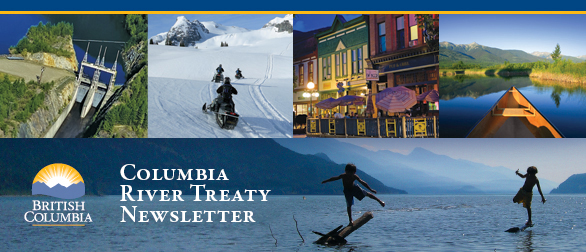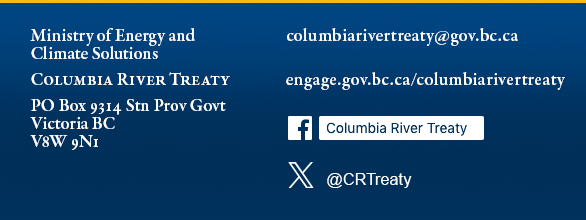Columbia River Treaty
Edition: September 2021

Youth Spotlight: Aislinn Dressler
Sep 28, 2021
My Journey from the Columbia River Field School to Premier of the Interior Youth Parliament
My name is Aislinn Dressler, and I am a 17-year-old from Fernie, B.C. I applied to the Columbia River Field School (CRFS) in 2019 on a whim. A teacher had passed around a pamphlet at my high school and, while I wasn’t really sold, I went home that night and completed my application. When I hit send, I believed I had no shot at being a participant. With no camping, canoeing or backcountry experience, I wasn’t really the type of outdoorsy person that would go to this kind of adventurous field school.
But then, I got the email that I had been accepted and this long shot was a reality. I packed and I was off to meet 19 strangers and paddle a river! This school was full of hands-on learning, with comprehensive viewpoints surrounding the Columbia River Treaty, and I returned home impassioned to make a difference. Paddling through the Columbia River watershed opened my eyes to the interconnectedness of the ecosystem, and meeting so many experts exposed me to the different perspectives surrounding the Treaty.
The decision to apply for this field school changed my life, as I gained confidence and the belief that I could make a difference. In September, I attended the International Columbia Basin Transboundary Conference and then applied for and became the inaugural Youth Councillor for the City of Fernie. A few months later, I attended the BC Youth Parliament (BCYP) in Victoria. This past year, I returned to BCYP as the Minister of the Southern Interior and, in June, became the Premier of the 2nd Interior Youth Parliament. It was at the Interior Youth Parliament (InYP) that I wrote two Private Member Resolutions with my hopes for the Columbia River Treaty. These two PMRs were titled:
- In Support of Including Local Indigenous Nations as Members of the Canadian Columbia River Treaty Renegotiation Team; and,
- In Support of Making the Environment a Priority for Canada in the Columbia River Treaty Renegotiations.
I chose these two topics because, to me, the points are vital components that must be considered when equitably modernizing this Treaty. With climate change and the need to take care of the world around us, the environment must be a priority. Through the CRFS, I met with scientists who detailed how the environment has been negatively impacted by Treaty dams and how we might mitigate these effects through tangible action, like maintaining more stable water levels. And, as reconciliation cannot happen without Indigenous input in processes that affect their unceded territories, I believe that inclusion and reconciliation must be priorities.
Ultimately, the Columbia River Field School and my journey to the Interior Youth Parliament have taught me the intersection between politics, advocacy and action. At Columbia River Field School, I learned about the Columbia River Treaty and gained valuable leadership skills that allowed me to become the inaugural Youth Councillor for Fernie. In this role, I advocated for youth in my community. Then, in BCYP, I used my knowledge to create change by running meaningful service projects and fundraisers as a Minister. The full circle culminated at InYP, where I used my youth voice to advocate for my wishes for the modernized Columbia River Treaty.
In 2021, I am off to the University of Victoria to study engineering. I can’t wait to see what the future holds for the Treaty, and I hope that Indigenous voices and the environment are prioritized.
Editor’s note: This is the second article in a new column highlighting youth experiences and perspectives in relation to the Columbia River Treaty. Stay tuned for more young voices!


